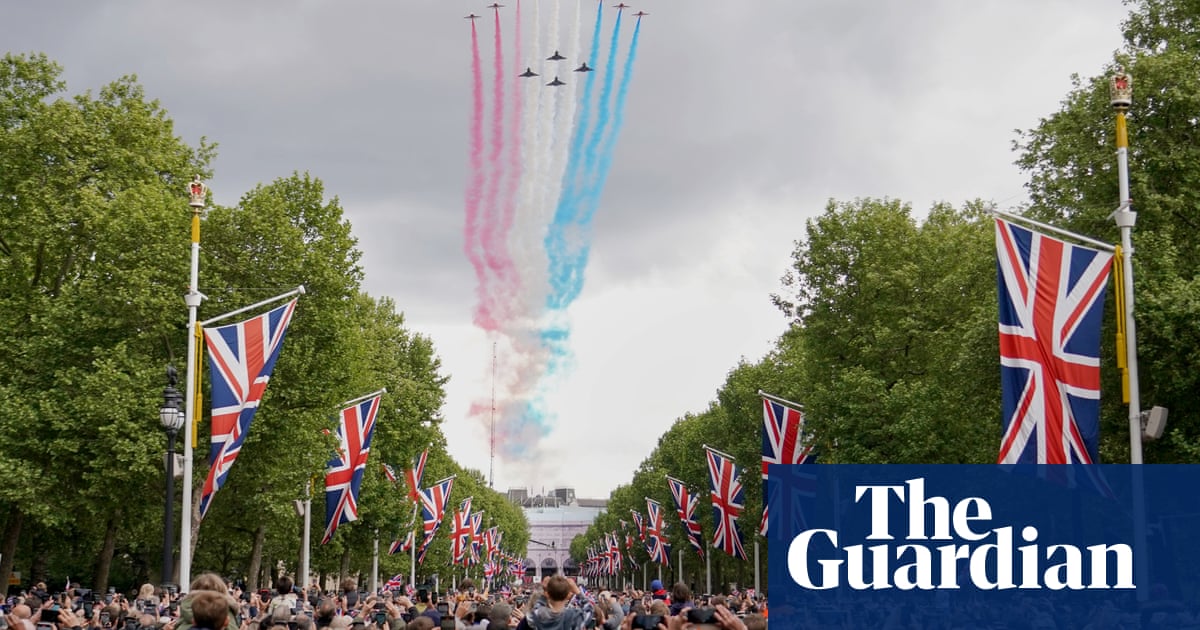As Big Ben chimed at noon and with the Cenotaph, the symbol of sacrifice, draped in the union flag for the first time since its unveiling in 1920, the UK marked the 80th anniversary ofVE Daywith military pomp before large crowds who had gathered in central London.
Buckingham Palace may have served as the centrepiece of Monday’s spectacle before Thursday’s anniversary of Victory in Europe Day. At the event’s heart, however, were the VVIP second world war veterans, those remaining few who bore actual witness then and who today serve to remind.
Back in 1945, Britain allowed itself a brief period of rejoicing on VE Day with overwhelming relief and optimism at Germany’s surrender after long wartime years of deprivation and huge loss of life on all sides.
On Monday, the first of four days of commemorations, tribute was paid with a 1,300-strong military procession, a flypast, marching bands, massed pipes and drums, and youth cadets.
The procession set off from beneath the bronze gaze of Churchill’s statue in Parliament Square and ended outside the palace. Elsewhere, street parties were held across the UK.
Thousands crowded on to the Mall, many waving red, white and blue flags. Watching from a dais on the Queen Victoria Memorial were the king, queen, senior royals and the prime minister, Keir Starmer, sitting alongside those who had served in the war and who were wrapped up both in their memories and against the spring chill.
As Big Ben fell silent, the actor Timothy Spall boomed aloud words from Churchill’s victory speech beginning: “My dear friends, this is your hour.”
Alan Kennett, a 100-year-old Normandy veteran, then started the parade as he was handed the Commonwealth War Graves torch for peace. In 1945, Kennett, from Lichfield, was in Celle, near Belsen, in a cinema with other men in his unit, when they were told the war had ended. “The whole place erupted and of course it became one great party,” he recalled.
UK armed forces personnel were joined by representatives from Commonwealth and Nato allies. A detachment of Ukrainian military, selected from the UK armed forces’ training programme for Ukrainian recruits, offered a reminder that while VE Day marked peace, war continued today in many corners of the world.
A Buckingham Palace tea party for 30 second world war veterans aged from 98 to 104, and about 20 evacuees and others who lived through the war, was being hosted by the king and queen.
Those invited included a 98-year-old former prisoner of war, a 99-year-old who served in the Desert Rats and took part in the D-day landings, and a 100-year-old woman who worked in the Special Operations Executive (SOE), known as Churchill’s secret army.
A flypast of 23 historic and current aircraft, including a Lancaster Bomber and the famous Red Arrows streaming red, white and blue, flew over the crowd in the Mall and the royals watching from the palace balcony to conclude Monday’s official commemorations.
Among those invited to the palace tea party was Joyce Wilding, 100, who enlisted at 18 into the First Aid Nursing Yeomanry and worked in the SOE. Recalling VE Day, she said: “We went to Piccadilly where there was a stream of people singing and dancing. We joined a crocodile and did the palais glide down Piccadilly. There were soldiers up lamp-posts, it was extraordinary.”
Bernard Morgan, a 101-year-old RAF D-day veteran who worked as a codebreaker, received a secret telegraph message two days before VE Day that read: “German war now over, surrender effective sometime tomorrow.” When it was officially confirmed on 8 May, he and his comrades lit a huge bonfire and celebrated until late into the night.
He said: “It’s so important that we make the most of these opportunities to remember what happened, not just to celebrate the achievement but also to ensure that such horrors never happen again.”
